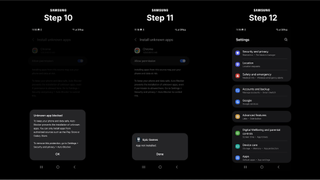Having pulled out an unexpected win in its years-long courtroom with tech colossus Google, Epic Games has decided it wants another go-around, and this time it's dragging Samsung into the fight for good measure.
As amusing as it is to imagine Epic CEO Tim Sweeney telling Tim Cook to "get more guys to make it a fair fight," Samsung is actually at the core of this particular lawsuit. The issue turns on Epic's plan to launch its own store on Android devices, which will enable it to distribute its own games, and eventually others, without having to pay a huge cut in revenues. Epic is legally allowed to do so after its courtroom victory—and it has—but Google and Samsung, so Epic alleges, are making the process as difficult as possible in order to dissuade users from actually using it.
"We are filing a court case against Google and Samsung over coordinated efforts to block competition in app distribution on Samsung devices with Samsung’s default-on Auto Blocker feature," Epic wrote in its lawsuit announcement. "Auto Blocker is the latest in a long series of dealings in which Google and Samsung have agreed not to compete to protect Google’s monopoly power. Auto Blocker cements the Google Play Store as the only viable way to get apps on Samsung devices, blocking every other store from competing on a level playing field.
"Our litigation alleges that Samsung’s recent implementation of the Auto Blocker feature was intentionally crafted in coordination with Google to preemptively undermine the U.S. District Court's remedy following the jury’s verdict in Epic’s case against Google. The jury found that Google’s app store practices are illegal, including the unlawful agreements Google enters into with phone manufacturers such as Samsung."
Samsung's Auto Blocker prevents users from installing software from unapproved sources, ostensibly a security feature to ensure Android owners don't end up with malicious software on their phones. That in itself isn't terribly uncommon. Epic's issue stems from the fact that, according to the lawsuit, Auto Blocker was originally an opt-in feature when it launched in October 2023, but in July 2024—shortly before the launch of the Epic Games Store on mobile—Samsung changed it to be on by default.
Making matters worse, the process for switching it off is a real pain in the ass: "An exceptionally onerous 21 step process," as Epic put it. Reinforcing the point, Epic included images of all 21 steps involved; not an insurmountable task, but it sure does look like a headache.

Epic alleges in the lawsuit that having Auto Blocker enabled by default "was a coordinated decision by Google and Samsung," saying that throughout its roughly 15 years as an Android device manufacturer, Samsung has never imposed "additional frictions" or blocks on direct downloading or third-party stores on its devices. The suit claims Google and Samsung have engaged in "a high number of atypical interfirm communications that go well beyond the 'standard fare' of business and trade-association practice," and that Samsung's move to help "entrench the Play Store monopoly" only makes sense "as part of a quid pro quo" between the companies.
The net result, Epic CEO Tim Sweeney said, is to drive Android owners away from third-party stores and back to the Play Store, where Google can extract its 30% cut of revenues.
"If we attempt to compete with Google Play and Samsung Galaxy Store and their 70% revenue share by offering developers an 88% revenue share, but 50% of our users give up, then after accounting for lost users and lost revenue, that 88% is reduced to an effective 44% revenue share," Sweeney posted, hopefully while wearing a chain mail hood. "Literally no store can compete with the incumbents when disadvantaged in this way. To have true competition, all reputable stores and apps must be free to compete on a level playing field. This is what our lawsuit seeks."
We’ve filed new antitrust and Unfair Competition Law claims against Google and Samsung. A jury found Google’s practices illegal and we’re concerned that Google is encouraging Android hardware makers and carriers to adopt and continue Google’s unlawful practices in advance of the… https://t.co/gBRFYgripdSeptember 30, 2024
As reported by The Verge, Sweeney acknowledged in an interview that Epic doesn't have proof of collusion, but he's hoping it will come out as part of the discovery process. He also said Epic didn't request approval as an "authorized source" from Samsung because the point isn't to get "special privileges" for Epic, but to make the platforms more accessible for all developers. He also said he approached Samsung privately to request that Auto Blocker be reverted to an opt-in feature, or that Samsung create "an honest whitelisting process" that would allow users to access legitimate apps, but the two companies couldn't agree on how to make it work, leading to the legal action.
If this sounds vaguely familiar, it could be that you're thinking of Sweeney's August comments about Apple's "malicious compliance" in the European Union: The EU's 2022 Digital Markets Act requires Apple to allow third-party storefronts on iOS devices, but Apple hasn't been making that process easy either. That's a separate and ongoing process (further complicated by the fact that the US does not require Apple to allow third-party stores) but there's definitely a sort of thematic similarity in play: The proverbial letter of the law is followed, but its spirit—in Epic's eyes—remains elusive.

 4 months ago
177
4 months ago
177








![Anime Reborn Units Tier List [RELEASE] (November 2024)](https://www.destructoid.com/wp-content/uploads/2024/11/anime-reborn-units-tier-list.jpg)
